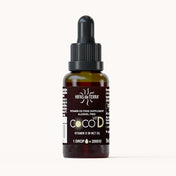Table of Contents
After an intense day, you get ready to sink into a deep and restful sleep. The sheets are cool, the pillow is soft, everything is ready for a perfect night's sleep.
But when you close your eyes, the murmurs of silence deepen and shadows dance on the walls. Your mind wakes, refusing to submit to the soothing repose of rest. You glance at the clock beside the bed and realise with dismay that the minutes are ticking by, and then the hours, relentlessly. You toss and turn in bed, desperately searching for a comfortable position that will take you to dreamland. But the dream seems to have vanished, giving way to a dark and endless void.
No doubt this is a well-known ailment: insomnia. In this article, we will look at the causes of this phenomenon and the solutions that can be put in place to alleviate it.
WHAT IS INSOMNIA?
Although it is easy to recognise insomnia when it is experienced, definitions vary depending on whether one consults the scientific literature or the general press. Most often, insomnia is defined by difficulty falling asleep. In this case, answering "yes" to the question "do you have trouble falling asleep or staying asleep" is sufficient to characterise insomnia.
For sleep scientists, the above definition is not sufficient to accurately characterise the profile of insomnia. It is therefore complemented by a series of disorders that help to draw a precise portrait of the insomniac:
- Difficulty falling asleep despite appropriate circumstances.
- The presence of a long sleep latency.
- Frequent nocturnal awakenings.
- Prolonged periods of wakefulness during sleep, or even frequent transient wakefulness.
- Impairment or distress during the day.
- Occurs at least three times a week and has been a problem for at least a month.
Insomnia may not have an underlying medical cause. Known as primary insomnia, this type of disorder is not caused by any specific health problem, but has many negative consequences. On the other hand, there is symptomatic insomnia caused by the individual's state of health: this is secondary insomnia. It can be caused by various diseases: asthma, depression, arthritis, cancer, pain or medication.

HOW DOES INSOMNIA OCCUR?
Research suggests that people suffering from insomnia are in a state of "hyperarousal", characterised by increased activity of the central nervous system and the hypothalamic-pituitary-adrenal axis, which is responsible for the stress response. This hyperarousal state prevents the patient from falling asleep. The resulting short night is characterised by a short duration of deep sleep, which is not very restful. In addition, GABA-inhibited brain activity in the cortex is thought to be reduced, which contributes to maintaining wakefulness.
WHAT ARE THE CAUSES OF INSOMNIA?
As already mentioned, there are several causes for the onset and/or chronicity of the different types of insomnia. All these factors share a common denominator: they reactivate our waking mechanisms.
CAUSES OF PRIMARY INSOMNIA:
- Genetics: Although no precise gene has yet been identified, this does not exclude the idea that insomnia is to some extent hereditary.
- Psychology: stress caused by major life changes, such as a change of job, death of a loved one, divorce or moving house.
- Environment: noise, light or temperature in the environment.
- Habits: changes in your sleep schedule, such as jet lag, a new job or bad habits developed when you had other sleep problems.
CAUSES OF SECONDARY INSOMNIA:
- Depression or anxiety
- Neurodegenerative diseases (Alzheimer's, Parkinson's...)
- Pain secondary to an illness.
- Psychoactive substances: caffeine, tobacco, alcohol, medicines or drugs. Consumption of caffeine, tobacco or alcohol, as well as illicit drugs.
- Hyperthyroidism and other endocrine problems.
- Sleep apnoea, restless legs syndrome.
- Pregnancy
- ADHD
- Premenstrual syndrome and menopause.
WHAT ARE THE CONSEQUENCES OF INSOMNIA?
When this condition becomes chronic over time, it can affect memory and concentration and increase the risk of hypertension, coronary heart disease, diabetes and cancer, according to the World Sleep Society.
The Sleep Foundation also points out that "headaches are a secondary symptom of a sleep disorder", which is another direct consequence of insomnia and affects daily well-being.
On the other hand, there are studies that link lack of rest with greater oxidation, metabolic problems and cognitive deterioration. In short: when the body's basic needs are not met, it starts to become maladjusted.
WHO IS MOST AFFECTED BY INSOMNIA?
Literature reviews estimate that around 30% of the population suffers from insomnia. However, this high prevalence must be put into perspective, as it only includes a fraction of the defined disorders. The application of stricter diagnostic criteria, derived from an international reference system, makes it possible to estimate the current prevalence at around 6%.
According to the National Institute for Health and Care Excellence, insomnia is the most common sleep disorder: 25-35% of the adult population and it is 1.5-2 time higher in women. In other words, some 7.2 million adults in UK suffer from insomnia and another 12 million admit to not getting a good night's rest.
ANTI-SOMNIA: TIPS TO PREVENT INSOMNIA
Thus, in order to fall asleep, it is essential that these awakening mechanisms are progressively deactivated and replaced by the processes that govern sleep. We have all experienced these episodes of restless sleep, without suffering from insomnia.
1.- Don't feel guilty. If you don't sleep well one night, you'll sleep better the next... don't let it become an obsession. Focus on the quality of your sleep rather than the quantity.
2.-Don't stay in bed awake for more than 20 minutes. Get up, go to another room and do a non-stimulating activity. Go back to bed when you feel sleepy again.
3.-Prepare for sleep: light meals, no stimulants such as coffee, tea, alcohol, etc. after 16.00 hours. No screens (blue light) before going to bed (at least one hour before). No sport or intense activities in the evening: avoid intellectual work and instead, relax and do what you enjoy.
4.-Regular sleep regimes: get up at the same time every morning, even on weekends. Your internal clock dictates your sleep patterns.
5.- The bedroom is reserved exclusively for sleep and privacy: no television, mobile phones or tablets, etc. Quiet, airy and cool room (around 18°C, because the body needs to lower its temperature before falling asleep) and in complete darkness (stimulates the secretion of melatonin, the sleep hormone, etc.).
6.- Get to know yourself better. Take advantage of a period when you have no obligations. Write down your sleep schedule in a sleep diary. The aim is to wake up with the feeling of having slept well and being fit.
7.- Try new methods: supplementation, phytotherapy, relaxation, self-massage, meditation, relaxation therapy, hypnosis, CBT (cognitive behavioural therapy)?
8.- Do physical activity or practice sports before 17.00 - 18.00 hours. Do not take a nap for more than 20 minutes.
9.-Listen to your body actively: go to bed at the first signs of sleepiness (yawning, heavy eyelids, itchy eyes, etc.).
10.- There are doctors and health professionals who can help, do not hesitate to consult them.

NATURAL SUBSTANCES OF INTEREST
Among the numerous active substances present in certain mushrooms, several have been studied for their potential benefits on sleep. Although more clinical trials are needed to confirm these effects, several promising avenues are emerging. Among the most studied mushrooms are Reishi (Ganoderma lucidum), Lion's Mane (Hericium erinaceus) and Cordyceps (Cordyceps sinensis).
Reishi mushroom, for example, is often used to help people relax and fall asleep. Many products, such as herbal teas and food supplements, contain it. Studies in animal models have shown that Reishi extracts can help people fall asleep more quickly, prolong the duration of sleep and promote a period of deep sleep. It can also act on delta wave activity, which is associated with the deep sleep phase.
CONCLUSION: SLEEP IS YOUR PRIORITY
Sleep is much more than just a requirement for health, performance and well-being: it is truly essential! When insomnia attacks you head-on, it is important to find a solution quickly.
When they are the result of pathologies, it is advisable to consult a doctor. However, for occasional and mild sleep problems, you can put the above recommendations into practice.
In addition to exercise and sports, adopting optimal sleep hygiene is a good starting point. This involves keeping a regular sleep schedule, avoiding alcohol, caffeine or nicotine before bedtime, and creating darkness in the bedroom to encourage the secretion of the sleep hormone melatonin.
In some cases, taking a supplement can also provide substances that promote balance. Animal studies have shown a reduction in the time it takes to fall asleep and an increase in the duration of sleep. However, this effect has not yet been fully demonstrated in humans and further research is needed.
















